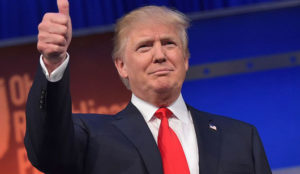Special to WorldTribune.com
New York — A jarring electoral earthquake has rocked America with a stunning upset win by Donald J. Trump, the Republican insurgent candidate.
The epicenter of the quake was centered in the South as expected, but reverberations and shockwaves went deep into the once industrial heartland of the Midwest. The political aftershocks have jolted his Democratic opponent Hillary Clinton, and have shattered the smug certainty of most pollsters, the mainstream media, and the Republican establishment.
The outcome has created the grist of history.

The Donald defied all expectations. After predictably winning his southern and midwestern strongholds, his political momentum led to wins key states such as Florida, North Carolina, Ohio, and Pennsylvania. Yet I hesitate to compare Trump’s improbable triumph with Ronald Reagan’s far more decisive win in 1980 or 1984; after all, Hillary won major regions such as the populous Northeast, New England, and the West Coast. Her popular vote tally is slightly higher than Trump’s. In the meantime, the electoral college count gives Trump 290 and Hillary 228; 270 votes are needed to win.
Hillary had the better campaign organization and ground game but Trump’s people possessed the energy and the enthusiasm. She represented the status quo and business as usual. Billionaires and Hedge fund moguls backed her too with 83% of such money going to Clinton. Whereas Donald Trump financed much of the campaign with his own formidable fortune, the fact remains the Democrat party outspend him nearly three to one.
Hillary’s hubris and a sense of entitlement became a millstone to her. Donald Trump’s own shortcomings became glaringly obvious during the long campaign.
Major media set the template, assuring the electorate Hillary would win. She was endorsed by billionaires, superstars, and the pompous jesters of late night TV.
Trump’s forgotten folks differ from the Silent Majority of the 1960’s in that the former Silent Majority were based in the middle class and often had well-paying blue-collar jobs. Many of those jobs have left America. The once Silent Majority has morphed into the Forgotten Americans who have largely been bypassed by the economic booms in Manhattan, San Francisco, and Boston.
The overriding theme for Trump voters was change.
Despite all the feel good talk about the economy, Americans are still hurting. Even former Democrat/socialist candidate Bernie Sanders admitted, “Trump tapped into the anger of a declining middle class that is sick and tired of establishment economics, establishment politics, and establishment media.”
Both candidates were polarizing and still deeply unpopular even inside their own parties. The president elect inherits a divided nation. Less than a day after his elections, a series of well-organized anti-Trump protests erupted in a dozen American cities.
Trump is first and foremost a populist and nationalist as compared to the traditional Republican or conservative templates. His instincts appear “conservative” with a small c. He appears to be a pragmatist, not an ideologue, and this will be key to his success and popularity. Donald Trump describes efforts to “Make America Great Again” as “Not a campaign but a movement.”
Despite the doom and gloom predictions of the pundits, the Republicans held both houses of Congress. Ironically working with the Republican Congress may present President Trump with his greatest challenge. The Donald is used to being a business CEO, not a consensus political CEO. Vice President elect Mike Pence will bring critical balance.
The tumultuous election underestimated turnout; not with the tech savvy younger electorate, but the forgotten folks who usually don’t vote, feel disenfranchised, and are in many ways out of the system.
Pundit Walter Russell Mead opined, “The George W. Bush administration inadvertently revived the American left; President Obama returned the favor for the nationalist right.”
In a gracious acceptance speech, Donald Trump vowed that “I will be President for all Americans.” He added, “It is time for us to come together as one united people.” Hillary Clinton offered grace and genuine conciliation in defeat.
On the Foreign Policy front Donald Trump stressed finding “Common ground not hostility.” Yet the president elect needs to fill the void of lacking global American leadership. Significantly one of his first meetings will be with Japan’s Prime Minister Shinzo Abe, to shore up the crucial relationship with Tokyo. He’s focused on close relations with South Korea, Germany, and the United Kingdom.
The Wall Street Journal editorialized, “Mr. Trump’s support is a testament to the democratic power of discontented voters.” The president elect pledged to “reclaim our country’s destiny,” and added, “The forgotten men and women of our country will be forgotten no longer.”
John J. Metzler is a United Nations correspondent covering diplomatic and defense issues. He is the author of Divided Dynamism the Diplomacy of Separated Nations: Germany, Korea, China (2014). [See pre-2011 Archives]

